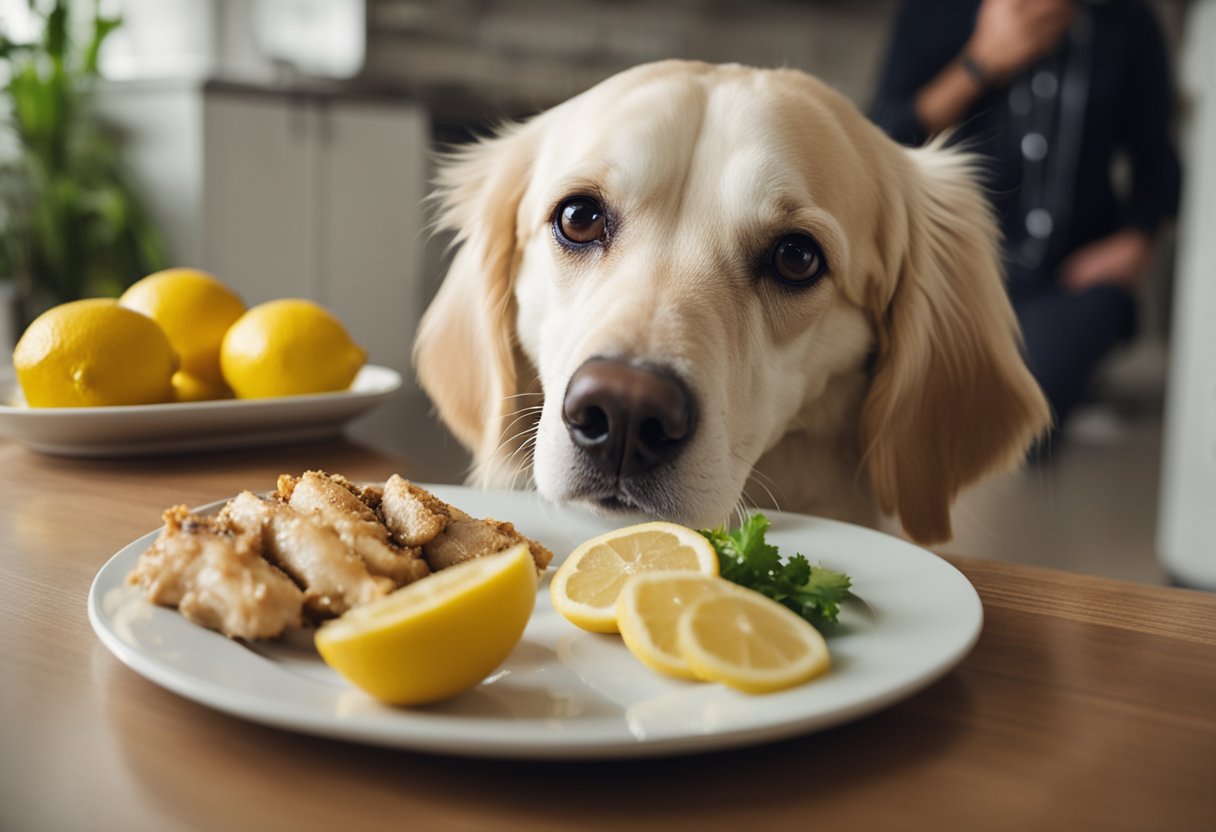Dogs are known for their love of food, and as pet owners, we often want to share our meals with them. However, not all human foods are safe for dogs to consume. One common question that pet owners have is whether their dogs can eat lemon pepper chicken.

Lemon pepper chicken is a popular dish that is enjoyed by many, but is it safe for dogs? The answer is no, dogs should not eat lemon pepper chicken. Lemon pepper seasoning contains ingredients such as garlic and onion powder, which are toxic to dogs and can cause digestive issues, anemia, and even death in severe cases. Additionally, lemon juice can upset a dog’s stomach and cause vomiting and diarrhea.
It is important to remember that dogs have different nutritional needs than humans and require a balanced diet that is specifically designed for their species. While it may be tempting to share your food with your furry friend, it is best to stick to dog-friendly treats and foods. If you are unsure about whether a particular food is safe for your dog to eat, it is always best to consult with your veterinarian.
Can Dogs Eat Lemon Pepper Chicken?

As a dog owner, I always want to make sure that the food I give to my furry friend is safe and healthy. One question that often comes up is whether dogs can eat lemon pepper chicken. After doing some research, here’s what I found:
Lemon pepper chicken is a popular dish that combines chicken with lemon juice, black pepper, and other spices. While chicken is a great source of protein for dogs, the lemon and pepper seasoning can be problematic.
Lemons are highly acidic and can cause stomach upset, vomiting, and diarrhea in dogs. Pepper, on the other hand, can irritate a dog’s digestive system and cause discomfort. Additionally, some lemon pepper seasoning blends may contain other ingredients that are harmful to dogs, such as garlic or onion powder.
Therefore, it is not recommended to feed your dog lemon pepper chicken. If you really want to give your dog chicken, it’s best to stick with plain, cooked chicken without any seasoning. You can also try adding some dog-friendly vegetables, such as carrots or green beans, to make the meal more nutritious.
In conclusion, while chicken is a great source of protein for dogs, lemon pepper seasoning can be harmful to their health. It’s always important to do your research and consult with a veterinarian before introducing any new foods to your dog’s diet.
Understanding Lemon Pepper Seasoning

Lemon pepper seasoning is a popular spice blend that is commonly used to flavor chicken, fish, and vegetables. It is made by combining lemon zest and black pepper, along with other spices such as salt, garlic, and onion. The seasoning can also contain essential oils derived from lemon, which give it a strong citrus flavor.
While lemon pepper seasoning can be a tasty addition to many dishes, it is important to understand its ingredients and how they might affect your dog’s health. Dogs can eat chicken, but certain seasonings, including lemon pepper, can be harmful to their health.
The black pepper in lemon pepper seasoning contains a compound called piperine, which can irritate a dog’s digestive system. Additionally, some dogs may be allergic to pepper, which can cause vomiting, diarrhea, and other symptoms.
Lemon zest, which is made from the outer layer of a lemon’s peel, is high in essential oils that can be toxic to dogs. These oils can cause vomiting, diarrhea, and even depression of the central nervous system.
Furthermore, some lemon pepper seasoning blends may contain other spices that are not safe for dogs, such as onion and garlic. These spices can cause anemia in dogs, which can be life-threatening.
In conclusion, while lemon pepper seasoning can be a delicious addition to your chicken, it is not safe for dogs to consume. If you want to share chicken with your furry friend, it is best to prepare it plain and without any seasoning.
Potential Risks of Lemon Pepper Chicken for Dogs
As a dog owner, you may be tempted to share your delicious lemon pepper chicken with your furry friend. However, it’s important to be aware of the potential risks that come with feeding your dog this human food.
Firstly, lemon pepper chicken is often high in sodium, which can lead to sodium poisoning in dogs if consumed in large amounts. Symptoms of sodium poisoning include excessive thirst, vomiting, diarrhea, abdominal pain, and dehydration. In severe cases, sodium poisoning can even be fatal.
In addition to the high sodium content, lemon pepper seasoning may also contain other ingredients that can be harmful to dogs. For example, some dogs may have allergies to certain spices or herbs found in the seasoning. Allergic reactions can lead to itching, swelling, and digestive upset.
Furthermore, lemon itself can be problematic for dogs. The acidity of lemon can cause digestive upset, including diarrhea and vomiting. Additionally, the essential oils found in lemon can be toxic to dogs and cause damage to their digestive system and liver.
Feeding your dog bones from the chicken can also be a choking hazard and cause damage to their digestive tract. Cooked bones can splinter and cause blockages or tears in the intestines.
If your dog does consume lemon pepper chicken and experiences any symptoms such as loss of appetite, lethargy, weakness, or other abnormal behavior, it’s important to seek veterinary care immediately.
In summary, while it may be tempting to share your food with your furry friend, it’s important to be aware of the potential risks and avoid feeding your dog lemon pepper chicken.
Effects of Chicken for Dogs
https://www.youtube.com/watch?v=Kknnn67R4jQ&embed=true
As a dog owner, you may be wondering if it is safe to feed your pet chicken. Chicken is a great source of protein and can be a healthy addition to your dog’s diet. However, it is important to be aware of the potential risks associated with feeding chicken to dogs.
One of the most significant risks of feeding chicken to dogs is the risk of splintered bones. Chicken bones can splinter easily and can cause serious digestive issues or even injury to your dog’s digestive system. Therefore, it is important to avoid feeding your dog chicken bones.
In addition to the risk of splintered bones, some dogs may have allergic reactions to chicken. If your dog is allergic to chicken, it may experience digestive issues or other harmful effects. Therefore, it is important to monitor your dog’s reaction to chicken and consult with a veterinarian if you suspect an allergic reaction.
It is also important to be aware of any harmful ingredients that may be present in chicken. Some chicken products may contain harmful additives or preservatives that can be harmful to your dog’s health. Therefore, it is important to read ingredient labels carefully and choose high-quality chicken products that are free from harmful additives.
In conclusion, chicken can be a healthy addition to your dog’s diet if fed in moderation and without bones. However, it is important to monitor your dog’s reaction to chicken and choose high-quality chicken products that are free from harmful additives. As always, consult with a veterinarian if you have any concerns about feeding chicken to your dog.
Safe Alternatives to Lemon Pepper Chicken
As a responsible pet owner, it’s essential to ensure that your furry friend’s diet is healthy and safe. While lemon pepper chicken may be a tasty treat for humans, it’s not recommended for dogs due to the potential digestive issues it may cause. Fortunately, there are many safe alternatives that you can offer your dog instead.
One of the best alternatives to lemon pepper chicken is boiled chicken. This lean protein source is easy to digest and provides your dog with the necessary nutrients without any added spices or seasonings that may upset their stomach. You can also add some carrots or green beans to the boiled chicken for added nutrition and flavor.
Fish is another excellent alternative to lemon pepper chicken. Fish is a great source of protein and omega-3 fatty acids, which are essential for your dog’s overall health. However, make sure to remove any bones before feeding it to your dog, as they can pose a choking hazard.
Vegetables are also a great option for dogs. Carrots and green beans are low in calories and high in fiber, making them an ideal snack for dogs. You can also try offering your dog some sweet potatoes or pumpkin, which are both high in fiber and vitamins.
When it comes to lean meats, turkey and beef are safe alternatives to lemon pepper chicken. However, make sure to avoid any processed meats, such as hot dogs or sausages, as they can be high in sodium and preservatives, which can be harmful to your dog’s health.
In conclusion, while lemon pepper chicken may be tempting to offer your dog, it’s best to avoid it due to the potential digestive issues it may cause. Instead, opt for safe alternatives such as boiled chicken, fish, vegetables, and lean meats. By providing your dog with a healthy and balanced diet, you can ensure their overall health and wellbeing.
Monitoring Your Dog’s Diet
https://www.youtube.com/watch?v=XRsZM2v6EwE&embed=true
As a responsible dog owner, I understand the importance of monitoring my dog’s diet to ensure that he stays healthy and happy. I consult with my veterinarian regularly to ensure that my dog is receiving a balanced diet that meets his nutritional needs.
I know that some human foods are not safe for dogs, and it is important to be aware of what foods are safe and what foods are not. For example, while chicken is a great source of protein for dogs, lemon pepper chicken may not be the best choice due to the seasoning and potential adverse reactions.
I also understand that moderation is key when it comes to feeding my dog human foods. While it may be tempting to give my dog a taste of what I am eating, I always make sure to only give him small amounts and avoid foods that are high in fat or sugar.
Overall, I believe that monitoring my dog’s diet is an essential part of being a responsible pet owner. By working with my veterinarian and being aware of what foods are safe and how much to feed my dog, I can ensure that he stays healthy and happy for years to come.
Benefits of Certain Foods for Dogs
As a dog owner, I always want to make sure that my furry friend is getting the best nutrition possible. That’s why I always pay attention to the types of foods that I feed him. Certain foods can provide a range of benefits for dogs, including health benefits, protein sources, antioxidants, fiber, nutrients, and vitamin C.
One of the most important things to consider when choosing a protein source for your dog is that it is a complete protein. This means that it contains all of the essential amino acids that your dog needs to maintain good health. Some great sources of complete protein for dogs include chicken, beef, lamb, and fish.
In addition to protein, many foods contain antioxidants, which can help to protect your dog’s cells from damage caused by free radicals. Foods that are high in antioxidants include blueberries, spinach, and sweet potatoes.
Fiber is another important nutrient that can benefit your dog’s health. It helps to regulate digestion and can also help to prevent constipation. Foods that are high in fiber include brown rice, oats, and vegetables like carrots and broccoli.
Nutrients like vitamin C are also important for your dog’s health. This vitamin is essential for the growth and repair of tissues in the body, and can also help to boost your dog’s immune system. Foods that are high in vitamin C include citrus fruits, strawberries, and bell peppers.
Overall, it’s important to remember that not all foods are created equal when it comes to your dog’s health. By choosing the right foods, you can help to ensure that your furry friend stays healthy and happy for years to come.
Specific Considerations for Different Breeds and Ages
As a dog owner, it is essential to be aware that different breeds and ages of dogs have varying nutritional requirements. When it comes to feeding your dog lemon pepper chicken, there are a few things to consider.
Breed Considerations
Different dog breeds have different dietary requirements. For instance, large breeds such as Great Danes and Mastiffs require more food than smaller breeds like Chihuahuas and Shih Tzus. This is because larger dogs have a higher metabolic rate and burn more calories.
Additionally, some breeds are more prone to certain health conditions that may be exacerbated by consuming certain foods. For example, Bulldogs and Pugs are prone to obesity, so it is important to monitor their calorie intake and avoid feeding them high-fat foods like lemon pepper chicken.
Age Considerations
Just like humans, dogs have different nutritional needs at different stages of life. Puppies require more protein and calories than adult dogs to support their growth and development. Similarly, senior dogs have different dietary requirements to maintain their health and prevent age-related diseases.
Feeding lemon pepper chicken to puppies and senior dogs may not be the best idea. Puppies may not be able to digest the spices and flavors in the chicken, while senior dogs may have trouble chewing and digesting the meat.
Size Considerations
The size of your dog also plays a role in their nutritional requirements. Small dogs have smaller stomachs and require smaller portions, while larger dogs require more food to meet their energy needs.
When feeding lemon pepper chicken to your dog, it is important to consider their size and adjust the portion accordingly. Feeding too much chicken can lead to weight gain and other health problems.
In conclusion, while lemon pepper chicken may be a tasty treat for your dog, it is important to consider their breed, age, and size before feeding it to them. If you are unsure about whether your dog can eat lemon pepper chicken, consult with your veterinarian for advice.






